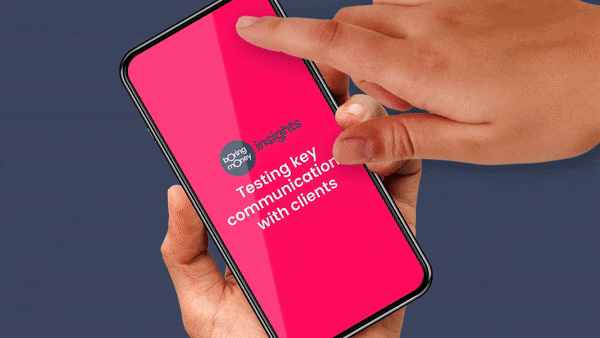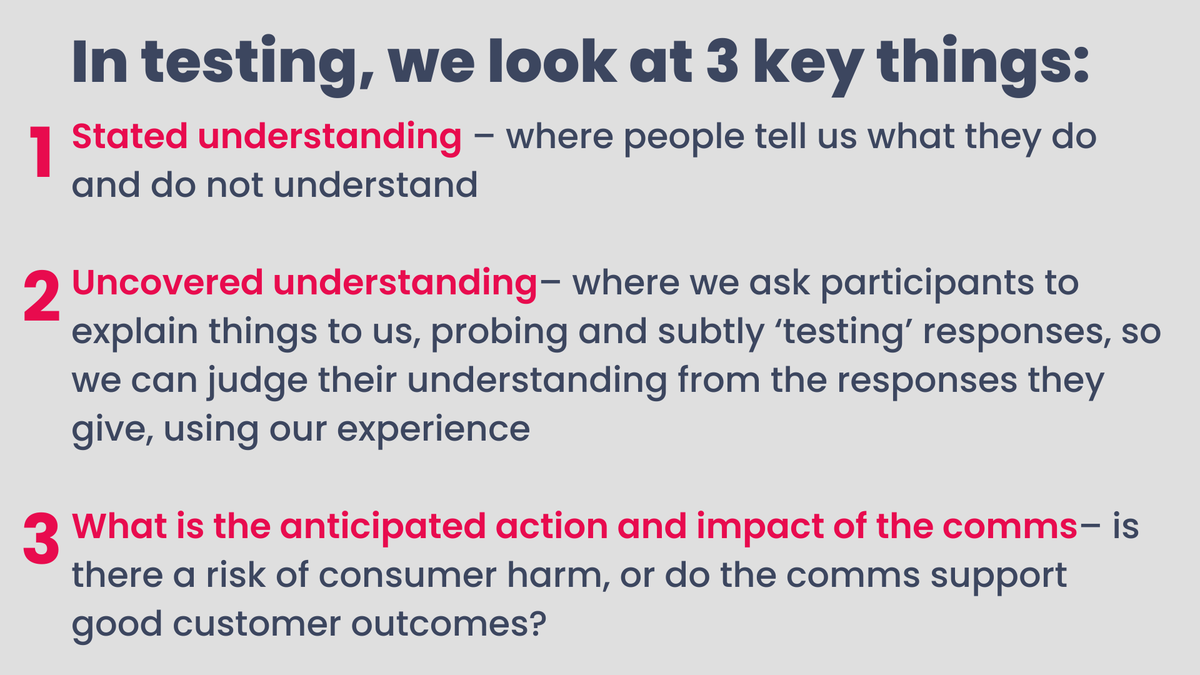Communications Testing in reaction to Consumer Duty
Consumer Duty requires firms to test their communications with customers, in order to ensure that consumers are able to: find information, comprehend the information, and that the information provided supports them to make good decisions that inform the right action for their investment objectives.
“Firms should develop an approach to testing that provides assurance that customers can identify and understand the information needed to make effective decisions.
8.45 FG22/5
“By testing significant communications with customers, firms are also able to learn from the findings and adapt communications to improve customer comprehension and support good outcomes.
8.55 FG22/5

Our Research team has vast experience advising asset managers, platforms and advice firms/wealth managers on good communications that are compliant with Consumer Duty and support good customer outcomes.
We have tried-and-tested methodologies of communications testing, assessing responses and providing priority recommendations.
Our approach to Consumer Duty comms testing goes far above standard comms testing and is led by our understanding of the regulations and the sector.
We've tested:
• Factsheets, KIIDS, SIDs, AoV, fund pages
• Letters, emails, suitability reports
• Brochures, welcome packs, FAQs
• Application forms
• Investment commentaries, insight pages
• Content videos, webinars, podcasts
• Webpages, tools and journeys
• Websites and navigation /UX

We have run small projects (testing a few key pieces of communications in depth) through to bigger ongoing programmes of testing a wide range of comms. Whatever the size of the project, we would be happy to talk through your requirements and advise on what might work for you as a best approach.
In-depth interviews - used to test individual comms, to include a 'graffiti' test from pre-placing materials
A traditional, tried-and-tested approach that we often recommend and use for detailed comms testing. It allow us to unpick nuances and provide you with detailed, actionable feedback.
We typically test 2-3 pieces with each person and can include website testing
You get rich, detailed insight and can really probe responses
Best used for testing individual comms in detail
Short-term panels - used to test various comms and complete tasks over a few days/a week
This approach involves recruiting participants to a short-term digital panel, where they can be asked to complete several tasks over a short period.
You can receive lots of feedback quickly and/or test journey comms in sequence - this gives us good feedback across multiple comms and/or for short journeys/parts of journeys
Best for testing various comms & journeys
Regular pop-up panels or long-term panels - used to test multiple comms over months or conduct ongoing research
This approach involves either a series of short-term panels running each month/quarter, or establishing a long-term ongoing panel
This offers a flexible, large-scale solution, allowing us to test multiple comms
A long-term panel offers the opportunity to conduct various research projects, including Consumer Duty and SDR comms, concept testing, etc.
Best for large quantities of research and an 'always on' programme
What’s involved?
A typical engagement will involve:
1. Graffiti testing – respondents mark up the document to indicate what they read or don’t read, understand or don’t understand, and like or don’t like.
2. In-depth interviews – after completing the graffiti testing, respondent take part in an interview with the Boring Money team to understand their written feedback and probe on their understanding on the document.
“For me there is too much usage of initials which don't mean a lot to me…"
Investor
“I found the information initially quite overwhelming and its definitely targeted at somebody with a more active interest in funds/the detail."
Investor
3. Boring Money analysis of both the graffiti test and interview responses – analysing in conjunction allows the team to dig deeper into the research findings and draw conclusions.
4. Key consumer feedback and practical recommendations for improvement – the Boring Money team then provide in-depth insights gathered, including any actions users may take and how these actions may or may not be appropriate for their goals. Boring Money’s experience also helps us to support firms with a practical set of recommendations for change, across various and critical document types.
Boring Money is also experienced in testing documentation with vulnerable clients and we can talk to you about additional requirements and specific approaches we take.
How long does it take?
The average lead time for a project which tests 5 documents with clients is typically 6 weeks from start to finish. We can recruit yours and your competitors’ clients quickly through our Boring Money Army.
Discover more!
Interested in this topic? Download our PDF to find out how we can help you test client documents.
Our Consumer Duty Tips
Consumer Testing for Sustainable Disclosure Requirements
The FCA’s new SDR measures are designed to improve consumer understanding of sustainable investing, and to improve trust in the sector, working to avoid greenwashing.
Our SDR aligned capabilities allow us to test key fund materials such as a KIIDs / factsheets, and website / marketing materials, and any other consumer facing sustainability information on the website and communication channels.
Talk to us about our dedicated approach to SDR Document Testing, allowing you to independently assess consumers understanding of communications pieces in line with anti-greenwashing regulations.